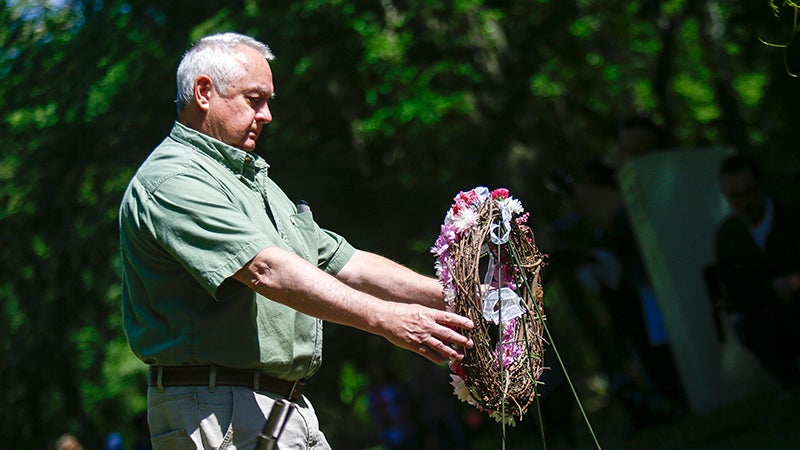Cahawba, Sultana descendants remember Union soliders
Published 7:17 pm Saturday, April 28, 2018

- Danny Jackson places a wreath on the grave of an unknown soldier Saturday at Old Cahawba Archaeological Park during a memorial for Union soldiers. (Alaina Denean Deshazo | Times-Journal)
By Adam Dodson | The Selma Times-Journal
The Old Cahawba Archaeological Park hosted members of the Sultana Association and Friends for a commemoration of the lost Union prisoners of war during the Sultana disaster.
On April 27, 1865, the worst maritime disaster in United States history took place aboard the Sultana steamboat when it was carrying Union POWs who were stationed at Cahawba’s wartime prison camp. The ship was carrying around 1,400 prisoners at the time when two boilers malfunctioned and caused the ship to go up in flames. The usual carrying capacity for the ship was 85 crew members along with around 300 passengers. Almost 1,200 people lost their lives.
The Sultana Association strives to keep their ancestors’ memories alive through shared history, letter-reading and the visitation of key places in their ancestors’ lives.
For those in the organization, every one of their ancestors spent time at the prison that once stood inside Old Cahawba.
According to Norman Shaw, member of the Sultana Association, Cahawba was the last place left to visit that has ties to their POW forefathers.
Members from Sultana and from Old Cahawba gathered inside the park, covered by ample trees and fields, for their program.
Members were treated to speaking exhibits put on by Cahawba site director Linda Derry, audience-participated hands-on history lessons and moments of unified respect for the lost ones in the disaster.
Amazed by the gravitas of the program were Penny Schlaffer and Sherry Lyle, sisters who are descendants of Sergeant Samuel A. Dyer, prisoner of Cahawba.
“Today has just been incredibly beautiful. This place is hauntingly gorgeous,” Shlaffer said.
“Our ancestor stood and slept right in this area. This is not my first time doing this, but it is for my sister. We have both loved it.”
Schlaffer and Lyle both have letters written from their forefather to his beloved, likely days before his imminent death on the waters near Memphis, Tennessee. Along with the sisters, other Sultana members and Cahawba members read letters in a space that was outlined to show the dimensions of the old prison.
While showing the prison, they sized things down to show how crowded the prison was and how difficult it was to do simple things such as sleep and eat. 25 volunteers were put into a small perimeter bunched so close together that it was impossible for them to sleep all at the same time.
While the prison may have been known as the best-kept during the Civil War, they still had fallbacks of their own. The water would sometimes rise, disallowing comfortable sleep and bringing along rats and other vermin.
“Imagine all these people sleeping together. Now, there is water up to their waist depending on where you were in the prison,” Derry said. “You are not sleeping comfortably.”
Sultana and Cahawba also had a memorial service for the ones lost in the disaster. A quartet sang while a representative placed a wreath on what is known as the grave of “the unknown soldier.”
To commemorate all the lost lives, along with the letter reading, individuals impersonating Union soldiers shot Cahawba’s cannon in their honor. After the boom of the cannon faded into the background, a moment of silence and reflection took place.
Following the cannon, the letter reading and other moments of mutual respect, the program participants and audience members got together for some community bonding near the visitor center of the park.
Derry, who is in charge of the implementation of the day’s events, called the reconnection of Sultana members and their ancestors a “heartfelt moment.”
As the descendants of the Sultana disaster leave Cahawba, they leave with a greater understanding and respect for what Union soldiers went through during trying times.
For more information about Old Cahawba Archeological Park, visit www.cahawba.com.



